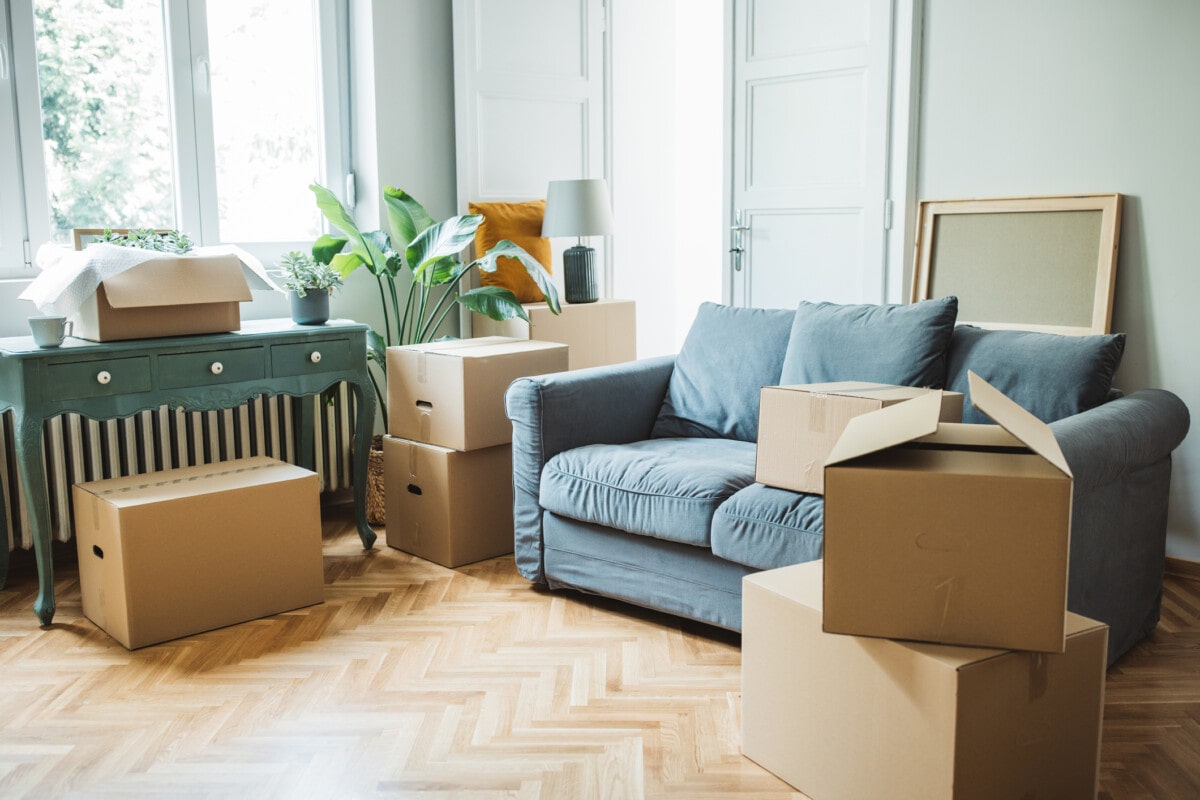Whether you’re moving out of your parent’s house or leaving the dorm life behind, becoming a first-time apartment renter is a big and exciting step. However, if you don’t know the ins and outs of the rental process, the task can seem overwhelming. Luckily, we at Redfin put together a list of 8 key tips to help first-time renters find their perfect first apartment and make the transition as smooth as possible. Whether you’re renting an apartment in Los Angeles, CA, or in Brooklyn, NY, these tips will be invaluable in your journey to securing the ideal rental space.

1. Your budget needs to cover more than just rent
If you’re a first-time apartment renter, knowing how to budget for your first apartment is crucial. Your monthly rent will, of course, be the most considerable expense you need to account for, but there are other one-time and ongoing fees that you should be able to pay. Let’s take a look at these costs more closely.
Initial, one-time costs
Before moving into your new apartment, you should save enough money to pay for the following upfront costs:
- Application fee(s)
- Security deposit
- First and last months’ rent (if required)
- Moving costs
- Furnishings, if needed
Recurring costs
Once you’ve moved into your first apartment, there are several ongoing expenses you’ll need to cover every month:
- Rent
- Utilities, such as electricity, garbage, water, sewage, etc.
- Internet and phone
- Parking
- Laundry
As a first-time apartment renter, this might be the first time you’re responsible for these types of expenses. The last thing you want to do is misjudge what you can afford because you forgot to factor in these essential components of your cost of living.
2. Make a list of needs, then prioritize them
Start with your dream apartment – what is your ultimate living situation? While you may not end up with everything on your list, it’s essential to understand what you value in your home. Some common needs for first-time apartment renters are:
- Functional kitchen
- Balcony, patio, or other private outdoor space
- Closet and storage space
- Proximity to work, nightlife, dog parks, or other amenities
- Natural light and direction of exposure
- Air conditioning
- Building amenities, such as a gym, rooftop, or business center
Once you have your list, prioritize the items from most to least important. This will help you narrow down your choices and choose between similar properties.
3. Ask a lot of questions during apartment tours
There are some things you just need to know when you’re shopping for apartments. You may direct these questions to your prospective landlord, or you might have to do some research on your own. Here is a list of must-ask questions, but you may choose to add others depending on your needs.
- How much is the rent?
- Are utilities included? If not, how much do they usually cost?
- How much is the security deposit?
- How do I pay rent and utilities?
- Is there a parking fee?
- Is the apartment pet-friendly, and if so, what are the associated fees?
- Are any deposits or fees refunded at the end of the lease?
- Do I need proof of renters insurance?
- What’s the application process, and is there a fee?
- How long is the lease term?
- How often does rent increase and by how much?
- What alterations can I make to my apartment?
- How is apartment maintenance dealt with?
- Is there a property manager?
- Am I responsible for any maintenance?
- What amenities are available nearby?
- Are there any particular policies I should know about?
These questions are just the beginning. You likely have special needs or preferences that should inspire additional questions. Keep a list of these questions with you when touring, along with a way of recording the answers.

4. Know the rental application requirements
Each apartment will have a different rental process. Generally, your process will include some or all of the following:
- Fill out an apartment application
- Show proof of income
- Complete a credit check
- Complete a background check
- Provide rental history with the landlord’s contact information or a personal reference
- Add a co-signer if you have a low credit score or no credit history
- Include an optional cover letter
To show proof of income, you’ll likely need to provide your most recent pay stubs. You can also use an offer letter or letter from your employer if you’re moving for work. Many landlords or property management companies want to see that you have a reliable monthly income appropriate for the rent payment. While it depends on the apartment, there is often an income requirement that the renter needs to make 2 to 3 times the monthly rent amount.
5. Clarify the parking situation
Some rentals come with a designated parking area or parking spot(s). If you plan to live with a roommate and you both have cars, are there enough parking spaces to easily accommodate both of you? When there are not enough parking spaces or tandem parking, roommates will often switch off week to week or find another acceptable compromise. If the apartment complex does have parking spaces, be sure to ask if this comes at an additional cost. Parking fees are becoming increasingly common at rental properties.
On the other hand, many apartments don’t come with parking, especially in bigger cities like New York City or San Francisco. In this case, pay close attention to the street parking. The street parking signs will tell you which days or times of day parking is limited or prohibited (usually for street-sweeping or snow plowing). But you should also note how many parking spaces are free on your street— is there plenty of room or are cars packed bumper to bumper? Streets with cars parked close together usually mean that parking is difficult to find.
6. Know the best time of year to rent an apartment
You can’t always control when you need to move, but if you do have flexibility, choosing the right time of year to rent an apartment could have a large impact. If your main concern is price, you’ll want to look for an apartment during the winter months. Typically, most people move in the summer months (college students moving away from home, etc.), so demand and prices are typically highest during this time and lowest in the winter. Keep in mind that while rent prices may be lower, there might not be a large selection of apartment complexes with availability.
On the other hand, if your ideal apartment is your top priority, then moving during the summer may be a better option. Most renters sign 12-month leases in the summer. Therefore, most leases usually also end around that time. This means the highest number of new apartments are coming on the market, so you’ll have plenty of options to choose from. The main downside here is that rent prices will typically be higher, and you’ll need to act fast before the best apartments are off the market.
7. Thoroughly read and understand the lease agreement
As a first-time apartment renter, reviewing your lease agreement is one of the most important steps to getting your apartment. Though the lease may contain complex language, it will outline the most important agreements you’re making by signing it. Here are a few things you should make a note of:
- The length of your lease
- The pet policy and any special terms (like additional fees)
- Deposit requirements and how your deposit is returned
- Sub-letting rules
- Utility responsibilities
- Maintenance procedures
- Liens or claims to your property if you don’t pay rent
When in doubt, having your lease reviewed by a landlord-tenant attorney is a great idea. The attorney will be able to catch any illegal provisions, explain how provisions work, point out unfavorable provisions and their consequences, and suggest changes that provide you with a more favorable lease.
8. Get renters insurance
In many cases, carrying renters insurance may be required by your landlord, especially if you’re a first-time apartment renter. Even if it isn’t, it’s still a good idea to have it – regardless of if you’re a long-time tenant or a first-time apartment renter. A renters insurance policy protects you in three significant ways:
- Personal property protection: If someone steals, damages, or destroys your personal belongings, you will receive a payout (minus the deductible).
- Personal liability: If someone gets hurt in your home, renters insurance will pay for medical bills and lost wages, depending on the terms of your policy. You may also be covered if you end up in a lawsuit.
- Loss of use: If your apartment becomes uninhabitable, loss of use coverage pays for your expenses, up to coverage limits, while you live outside your home.
Always be sure to review your policy carefully. It’s a good idea to create an inventory of your personal belongings so that you both have a record of what you own and ensure your coverage limits are high enough to protect you in the event of a total loss. If you are unsure about any part of your insurance policy, speak with your agent.

A final note on renting your first apartment
Searching and finding a perfect apartment rental requires some diligence, patience, and preparation. By following these tips, you can avoid possible pitfalls and make your apartment hunting process as seamless as possible, especially if you’re a first-time apartment renter.



























 United States
United States Canada
Canada